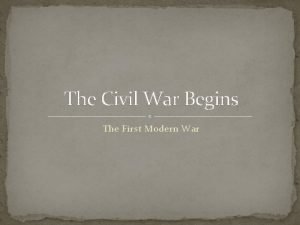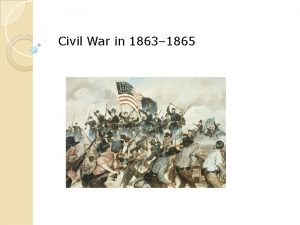CIVIL WAR 1863 1865 African American Soldiers African













- Slides: 13

CIVIL WAR (1863 -1865)

African American Soldiers

African American Soldiers Over 250, 000 signed up to fight for USA, over half of those were runaway slaves. 54 th Massachusetts Volunteers � Heroics in battle. Paid less than whites. Refused all pay until equal pay signed off by Lincoln. � “We did not come to fight for money”.

War Casualties

War Casualties By 1863, early enthusiasm for the war was dying. Many dead, more wounded, most dying from disease. New weapons causing massive destruction and death: � Napoleon Cannon – shot a canister of lead, iron, nails that sprayed shrapnel everywhere. � Rifle – caused bullet to spin through barrel, causing greater accuracy.

Fall of Vicksburg May 1863: Grant surrounds Vicksburg; lays siege to city for 6 wks. ; last southern stronghold on Miss. River. � “A cat could not have crept out of Vicksburg without being discovered”. Residents eat mules, horses, rats, etc. Eventually surrender on July 4, 1863 – same day as Gettysburg loss. � “The signs look better” – Lincoln.

Women in the War Effort

Women in War With men at war, women took to their jobs – farming, industry, government positions, etc. Also served as soldiers, spies, and especially nurses. � Union nurses organized by Dorothea Dix, trained by Elizabeth Blackwell. � Most famous nurse – Clara Barton. Founds Red Cross. Battlefield “hospitals” were absolutely awful. . . � No knowledge of disease, infection, sanitation, etc.

Total Destruction in the South

Total Destruction in the South Both armies (Grant and Lee) settle into Petersburg, a RR town, for a long siege. � Grant, “The Butcher”, has now lost more troops than Lee currently has, but Lee is running out of reinforcements. Lincoln finally finds an aggressive commander – Grant. � 1864: Grant marches into Virginia towards Richmond with 100, 000 men in pursuit of Lee’s army. � Loses 17, 000 men at The Wilderness; vows “We will not retreat”.

Sherman’s Part While Grant is battling Lee in Petersburg, Sherman is marching through the South. . . � � Sept. 1864: Sherman takes Atlanta. Burns to ground. Engages in “Total War” as he marches across Georgia to the coast – Savannah. Pushes north into the Carolinas. Destroys railroads, farms, houses, etc. Passes through 425 miles of Conf. territory, causes over $100 million damage “We cannot change the hearts of these people of the South, but we can make war so terrible. . . and make them so sick of war that generations will pass away before they again appeal to it. ”

Lee’s Surrender

Surrender April 1865: Grant breaks through at Petersburg; pushes Lee to Appomattox. With Grant in hot pursuit and his army small and starving, Lee meets with Grant and surrenders at Appomattox Ct. House. � “There is nothing left for me to do but to go and see General Grant, and I would rather die a thousand deaths. ” Grant negotiates compassionate surrender terms: Conf. free to return home; can keep horses and mules. � Grant provides 25, 000 rations to starving Conf. army. �
 Realism regionalism and naturalism
Realism regionalism and naturalism Why was the civil war the first modern war
Why was the civil war the first modern war Chapter 16 lesson 2 challenges to slavery
Chapter 16 lesson 2 challenges to slavery American civil war battles map
American civil war battles map Remains by simon armitage analysis
Remains by simon armitage analysis July 1-4 1863
July 1-4 1863 Second industrial revolution timeline
Second industrial revolution timeline Manet, olympia, 1863
Manet, olympia, 1863 Impressionism 1867 to 1886
Impressionism 1867 to 1886 The stonebreakers
The stonebreakers Olympia gauguin
Olympia gauguin Edouard manet olympia 1863
Edouard manet olympia 1863 Edouard manet olympia 1863
Edouard manet olympia 1863 Olympia, 1863
Olympia, 1863

























